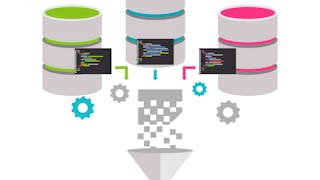This is the second of four courses in the Google Business Intelligence Certificate. In this course, you'll explore data modeling and how databases are designed. Then you’ll learn about extract, transform, load (ETL) processes that extract data from source systems, transform it into formats that enable analysis, and drive business processes and goals.


The Path to Insights: Data Models and Pipelines
本课程是 Google Business Intelligence 专业证书 的一部分
66,200 人已注册
包含在 中
您将学到什么
Build data models that answer business questions
Apply the ETL process to workplace scenarios
Explore ETL tools
Construct a pipeline to deliver necessary data
您将获得的技能
要了解的详细信息
了解顶级公司的员工如何掌握热门技能

积累 Data Analysis 领域的专业知识
- 向行业专家学习新概念
- 获得对主题或工具的基础理解
- 通过实践项目培养工作相关技能
- 通过 Google 获得可共享的职业证书

该课程共有4个模块
You’ll start this course by exploring data modeling, common schemas, and database elements. You’ll consider how business needs determine the kinds of database systems that BI professionals implement. Then, you’ll discover pipelines and ETL processes, which are tools that move data and ensure that it’s accessible and useful.
涵盖的内容
19个视频16篇阅读材料9个作业2个插件
You’ll learn more about database systems, including data marts, data lakes, data warehouses, and ETL processes. You’ll also investigate the five factors of database performance: workload, throughput, resources, optimization, and contention. Finally, you’ll consider how to design efficient queries that get the most from a system.
涵盖的内容
6个视频7篇阅读材料3个作业2个插件
You’ll learn about optimization techniques including ETL quality testing, data schema validation, business rule verification, and general performance testing. You’ll also explore data integrity and learn how built-in quality checks defend against potential problems. Finally, you’ll focus on verifying business rules and general performance testing to make sure pipelines meet the intended business need.
涵盖的内容
10个视频10篇阅读材料5个作业2个插件
You’ll complete an end-of-course project by creating a pipeline process to deliver data to a target table and developing reports based on project needs. You’ll also ensure that the pipeline is performing correctly and that there are built-in defenses against data quality issues.
涵盖的内容
5个视频12篇阅读材料3个作业
获得职业证书
将此证书添加到您的 LinkedIn 个人资料、简历或履历中。在社交媒体和绩效考核中分享。
位教师

提供方
从 Data Analysis 浏览更多内容
 状态:免费试用
状态:免费试用 状态:免费试用
状态:免费试用 状态:免费试用
状态:免费试用
人们为什么选择 Coursera 来帮助自己实现职业发展




学生评论
689 条评论
- 5 stars
81.71%
- 4 stars
11.42%
- 3 stars
3.28%
- 2 stars
2%
- 1 star
1.57%
显示 3/689 个
已于 Apr 12, 2023审阅
Course materials [check], delivery [check], testing knowledge [check]. Thanks, Ed👏
已于 Mar 14, 2024审阅
A good well explained introduction to Data modelling.
已于 Dec 16, 2023审阅
Hi, I'm a university student. I followed the course gain knowledge and to find a job. Instructors, Google, Coursera gave a great learning exposure. The course was perfect. Thank you you very much.
常见问题
Organizations of all types and sizes have business processes that generate massive volumes of data. Information is constantly created by computers, the internet, phones, texts, streaming video, photographs, sensors, and more. In the global digital landscape, data is increasingly imprecise, chaotic, and unstructured. As the speed and variety of data increase exponentially, organizations are struggling to keep pace.
Business intelligence is the work involved in gathering, structuring, interpreting, monitoring, and reporting this data in accessible formats that enable stakeholders to understand and use it effectively. Organizations rely on this information to make better strategic and operational business decisions. As a result, there is high demand in the marketplace for business intelligence professionals with the skills and expertise to achieve these goals.
Business intelligence professionals are critical to many organizations today. They use data to help solve business problems, performing a variety of tasks that enable decision makers to understand and use data effectively. Some common responsibilities of BI professionals include gathering project requirements from stakeholders, retrieving and organizing large datasets, and creating visualizations and dashboards to report insights to others. Organizations use the intelligence they share to make decisions, develop new processes, create business strategies, and conduct deeper analyses.
As businesses generate more and more data, there is increased demand for BI professionals to transform this data into meaningful business insights. BI skills are transferable to jobs across multiple industries, including financial services, education, healthcare, and manufacturing. The Google Business Intelligence Certificate will help you prepare for a job in the BI field.
更多问题
提供助学金,
¹ 本课程的部分作业采用 AI 评分。对于这些作业,将根据 Coursera 隐私声明使用您的数据。





